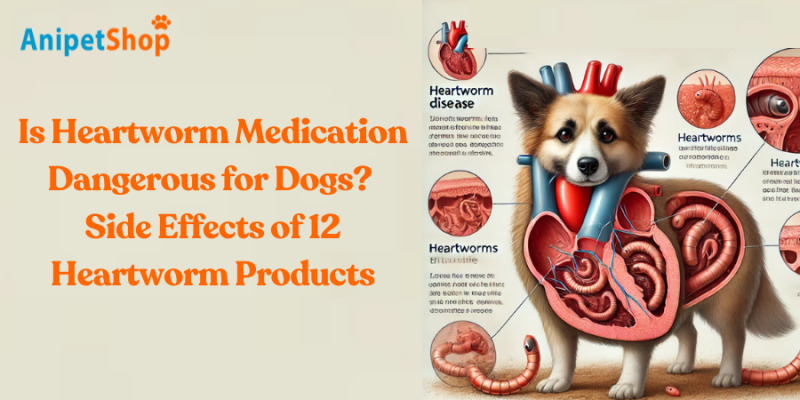Is Heartworm Medication Dangerous for Dogs? Side Effects of 12 Heartworm Products
Heartworm medication is a crucial aspect of preventive care for dogs, but many pet owners have concerns about its safety. While these medications are generally considered safe and effective, it’s important to understand whether heartworm medication is harmful to dogs and discover the side effects of 12 popular heartworm products for your dogs.

Is Heartworm Medication Harmful to Dogs?
Heartworm medication is generally considered safe for most dogs when used as directed, but it can have potential side effects. Common side effects include vomiting, diarrhea, and lethargy. More serious but rare side effects may include seizures or allergic reactions. Some breeds, particularly herding dogs, may be more sensitive due to a genetic mutation. While the benefits typically outweigh the risks, it’s important to consult with a veterinarian to determine the best prevention method for your specific dog.
Side Effects of 12 Popular Heartworm Products
Heartgard Plus/Iverhart Plus/TriHeart Plus
Active ingredients: Ivermectin and pyrantel pamoate. Ivermectin kills heartworm larvae, while pyrantel targets intestinal parasites. It works by paralyzing the nervous system of parasites. Effective against heartworms, roundworms, and hookworms.
Side effects:
- Vomiting
- Diarrhea
- Depression/lethargy
- Anorexia
- Convulsions (rare)
- Ataxia (rare)
- Allergic reactions: itching, hives, swelling of face (rare)
- Death (extremely rare)
Interceptor
Active ingredient: Milbemycin oxime. It works by interfering with nerve transmission in parasites. Effective against heartworms, roundworms, hookworms, and whipworms.
Side effects:
- Vomiting
- Diarrhea (including bloody diarrhea)
- Depression/lethargy
- Anorexia
- Convulsions (rare)
- Ataxia (rare)
- Trembling
- Death (extremely rare)
Trifexis
Active ingredients: Spinosad and milbemycin oxime. Spinosad targets fleas, while milbemycin oxime kills heartworm larvae and other parasites. Effective against heartworms, fleas, and intestinal parasites.
Side effects:
- Vomiting
- Lethargy
- Decreased appetite
- Diarrhea
- Itching
Revolution
Active ingredient: Selamectin. It’s a topical medication that enters the bloodstream through the skin. Effective against heartworms, fleas, ear mites, and some intestinal parasites.
Side effects:
- Skin irritation at application site
- Digestive upset (rare)
- Hair loss at application site
- Salivation
Advantage Multi
Active ingredients: Imidacloprid and moxidectin. Imidacloprid targets fleas, while moxidectin kills heartworm larvae and other parasites. Applied topically, it’s effective against heartworms, fleas, and various intestinal parasites.
Side effects:
- Skin irritation at application site
- Depression/lethargy
- Vomiting (rare)
ProHeart 6/12
Active ingredient: Moxidectin. It’s an injectable medication that provides extended protection. Effective against heartworms for 6 or 12 months, depending on the formulation.
Side effects:
- Injection site reactions (tenderness, swelling)
- Lethargy
- Decreased appetite
- Vomiting (rare)
- Seizures (very rare)
- Anaphylaxis (extremely rare)
Simparica Trio
Active ingredients: Sarolaner, moxidectin, and pyrantel. Sarolaner targets fleas and ticks, moxidectin kills heartworm larvae, and pyrantel eliminates intestinal parasites. Effective against heartworms, fleas, ticks, and intestinal parasites.
Side effects:
- Vomiting
- Diarrhea
- Lethargy
- Anorexia
Credelio
Active ingredient: Lotilaner. It’s an oral medication that targets fleas and ticks. While not primarily a heartworm preventative, it’s often used in combination with other medications.
Side effects:
- Vomiting
- Decreased appetite
- Diarrhea
- Elevated blood urea nitrogen (rare)
NexGard
Active ingredient: Afoxolaner. It’s an oral medication that primarily targets fleas and ticks. Like Credelio, it’s often used alongside heartworm preventatives.
Side effects:
- Vomiting
- Diarrhea
- Lethargy
- Dry/flaky skin
- Hyperactivity (rare)
Bravecto
Active ingredient: Fluralaner. It provides extended protection against fleas and ticks. While not a heartworm preventative, it’s often used in combination with one.
Side effects:
- Vomiting
- Decreased appetite
- Diarrhea
- Lethargy
- Polydipsia (increased thirst)
Diethylcarbamazine
Active ingredient: Diethylcarbamazine. It works by paralyzing microfilariae (immature heartworms). Effective against heartworms but must be given daily.
Side effects:
- Vomiting
- Diarrhea
- Anorexia
- Depression
Diroban
Active ingredient: Melarsomine dihydrochloride. It’s used for treating adult heartworms, not as a preventative. It kills adult heartworms in the dog’s body.
Side effects:
- Injection site reactions
- Lethargy
- Coughing
- Loss of appetite
- Fever
- Pulmonary embolism (serious complication)
How long do heartworm medication side effects last?
Heartworm medication side effects in dogs are typically mild and short-lived, usually resolving within 24 to 48 hours after administration. Common side effects include vomiting, diarrhea, lethargy, and loss of appetite. More severe reactions, though rare, may include allergic reactions, neurological issues, or injection site reactions for injectable medications.
Most oral medications show low incidence of side effects. For example, clinical trials of Heartgard Plus reported vomiting or diarrhea in only 1.1% of administered doses within 24 hours. Injectable preventatives like ProHeart may cause tenderness at the injection site for about 24 hours.
If side effects persist beyond 2-3 days or worsen, it’s recommended to contact a veterinarian. In some cases, dogs may experience behavioral changes like depression or lethargy for up to a week after treatment. While these side effects are usually temporary, it’s important to understand the full scope of heartworm treatment and potential complications. For a comprehensive guide on managing heartworm infections, you can learn more about How to Treat Heartworms in Dogs.
Conclusion
Overall, while heartworm medication is crucial for protecting dogs from the potentially fatal consequences of heartworm disease, pet owners need to be aware of the potential dangers associated with these medications. Common side effects such as vomiting and diarrhea are generally mild and manageable, but serious adverse reactions like allergic reactions, seizures, and neurological issues can occur, albeit rarely. Pet owners should also be careful to be monitored by a veterinarian, adherence to dosage instructions, and prompt reporting of any concerning symptoms are essential in mitigating these risks and ensuring the safety and well-being of our canine companions.
References:
-
Lobetti, R., Brianti, E., Cassini, R., Calderini, P., Furlanello, T., Genchi, C., … Antognoni, L. (2021). Tick-borne pathogens in dogs living in different areas of Italy: Seroprevalence and risk factors. PLOS ONE, 16(8), e0255847. https://doi.org/10.1371/journal.pone.0255847
-
Cassimatis, J. (2023, February 13). Study shows increased cardiovascular risks associated with canine heartworm infection. dvm360. https://www.dvm360.com/view/study-shows-increased-cardiovascular-risks-associated-with-canine-heartworm-infection
-
Washington State University College of Veterinary Medicine. (2021, October 19). Are heartworm prevention products safe if my dog has the MDR1 mutation?. https://prime.vetmed.wsu.edu/2021/10/19/are-heartworm-prevention-products-safe-if-my-dog-has-the-mdr1-mutation/
Lily Watson is an author specializing in veterinary care in Australia. With a profound passion for animal welfare and a solid foundation in veterinary science, Lily has dedicated herself to disseminating valuable knowledge and information for both pet owners and professionals in this field.

